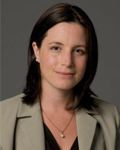Judgment Biases: Where Do They Come From? What Can We Do About Them?
We develop implicit bias as young children. In this session, we will discuss how our stereotypes develop and how they influence how we see ourselves and others. These biases permeate academia, influencing what choices we make, and whom we select as employees and leaders. There will be a discussion of the many ways to minimize the effects of implicit bias on assessment, recruitment, and selection. Best practices will be discussed, including the need to think critically about evaluation criteria and techniques for “widening the pool” of individuals.
Speakers

Anne Churchland, PhD
Anne K. Churchland is an assistant professor at Cold Spring Harbor Laboratory. Churchland received her PhD in neuroscience from the University of California, San Francisco and did a postdoctoral fellowship at the University of Washington in the physiology and biophysics department. In starting her own laboratory, Churchland began studying decision-making using rodent models, to take advantage of emerging tools for circuit dissection. Her laboratory has been a major player in bringing behavioral paradigms to rodents that have been successful in elucidating neural mechanisms in humans and primates, including perceptual decision-making and multisensory integration. She is a founding member of the International Brain Laboratory, a collaboration of 21 experimentalists and theorists that aims to generate a brain-wide theory of decision-making.

Andrei Cimpian, PhD
Andrei Cimpian (http://CimpianLab.com) is an associate professor of psychology at New York University. One of his main areas of expertise is academic achievement and motivation. Among other topics, he has investigated common cultural beliefs about intellectual ability, including stereotypes about who has such ability, and the effects these beliefs have on young people's aspirations and achievements. In a second line of work, Cimpian investigates the development of children's concepts of natural kinds and social groups, and their explanations for what they observe in the world. His research has been published in top journals, such as Science, Behavioral and Brain Sciences, and Psychological Science, earning him the 2018 American Psychological Association Distinguished Scientific Award for Early Career Contribution to Psychology. Media outlets such as The New York Times, The Atlantic, The Washington Post, NPR, and The Economist have covered his work. Cimpian earned a PhD in psychology from Stanford University.

Ione Fine, PhD
Ione Fine is a co-organizer of this virtual conference, full professor at the University of Washington, and fellow of the Optical Society of America. Her research examines the mechanisms of plasticity in the human brain by linking changes in behavior to changes in neuroanatomy, with a focus on the effects of early blindness and prosthetic vision. She received her undergraduate degree from Oxford University and PhD from the University of Rochester, and she carried out postdoctoral research at the University of California, San Diego.
More in Professional Development
4 of 5 articles left
Login
or
Become a Member
to unlock content





